
What Is tarsal tunnel syndrome?
Tarsal tunnel syndrome (TTS) is entrapment of the posterior tibial nerve in tarsal tunnel where the nerve winds around the medial malleolus. It may also involve only one terminal branch distal to tarsal tunnel. In such cases, the clinical presentation Is pain in the medial part of heel and sensory disturbance in the same region.
What are the causes of TTS?

- 50% of the cases are idiopathic.
- It may also occur as a result of trauma or overuse associated with excessive pronation.
- Ganglion
- Talonavicular coalition
- Lipoma
- Accessory muscle-flexor digitorium accessorius longus
- Tenosynovitis; associated with arthritis
- Fracture of distal tibia or calcaneus
What are the clinical features of TTS?
- Burning, tingling or numb sensation on the plantar aspect of the foot, often radiating into the toes.
- Pain Is usually aggravated by activity and relieved by rest
- Pain gets worse in night time for some patients, and gets relived by getting up and moving, or massaging the foot.
- Swelling, varicosities or thickenings may be found on examination around the medial ankle or heel.
- Ganglion or cyst may be palpable in tendon sheaths around the medial ankle.
- Tapping over the posterior tibial nerve (Tinel’s sign test) mat elicit the patient’s pain and very occasionally cause fasciculations.
- Altered sensation along the arch of foot.
- In chronic cases, muscle weakness of toe abductors and flexors can be demonstrated.
How is TTS diagnosed?
- Nerve conduction studies
- Ultrasound
- MRI
- CT scan
- Physiotherapists provocative tests
How can Physiotherapy help?
In order to alleviate symptoms, enhance function, and avoid recurrence, physiotherapy is critical component for treatment of TTS. This is how it can help:
- Assessment and Diagnosis: It is the first stage in physiotherapy management to confirm the diagnosis of TTS and identify any relevant parameters.
- Education: you will receive a proper education from the Physiotherapist on TTS, its causes, and how particular routines or behaviors may be aggravating the condition.
- Exercises for Flexibility and Strength: Stretching exercises can assist release tension in the tarsal tube and nearby structures. Exercises that increase foot stability focus on strengthening the muscles that maintain the foot's arch. Exercises that strengthen the intrinsic foot muscles, such as toe curls and heel raises, can be helpful.
- Manual therapy: Physiotherapist will help you to ease muscular tension, enhance joint mobility, and lessen nerve compression with the help of different techniques.
- Orthotic management: Physio may also advise specialised orthotic devices or arch supports. These may assist in easing the tension on the tibial nerve.
- Gait analysis: Your physiotherapist can offer advice on gait adjustments and suggested footwear. It can assist you find any anomalies that might be causing TTS by examining your running and walking routines.
- Bracing and tape: In some circumstances, bracing or taping may be utilised to increase stability, reduce pressure on the tibial nerve, and offer temporary support to the injured area.
- Home Exercise Programs: Your physiotherapist will create a home exercise program that is customised to your needs in order to supplement in-clinic treatment. Long-term development requires consistency with these activities.
- Pain management: To control pain and inflammation, methods like cold, heat, or modalities like ultrasound or TENS (transcutaneous electrical nerve stimulation) may be utilised.
- Monitoring and Progression: Physiotherapy for TTS is frequently a progressive form of care. Your physical therapist will keep track of your development and modify the therapy strategy as necessary.
Written by Yashaswi Solanki.
Yash has a diverse professional background, having worked as a sports physiotherapist in various sports such as tennis and cricket (with the Mumbai Indians junior team), as well as in aged care. Her clinical experience includes expertise in cervical, spine, and neuro rehabilitation, spine manipulation, mobilisation, post-surgical rehabilitation, and hydrotherapy.
My Physio My Health
Trust our team of physiotherapists to help you recover faster and improve your quality of life.

 WISHING EVERYONE A HAPPY NEW YEAR! WE'VE RETURNED TO OUR REGULAR OPENING HOURS
WISHING EVERYONE A HAPPY NEW YEAR! WE'VE RETURNED TO OUR REGULAR OPENING HOURS



